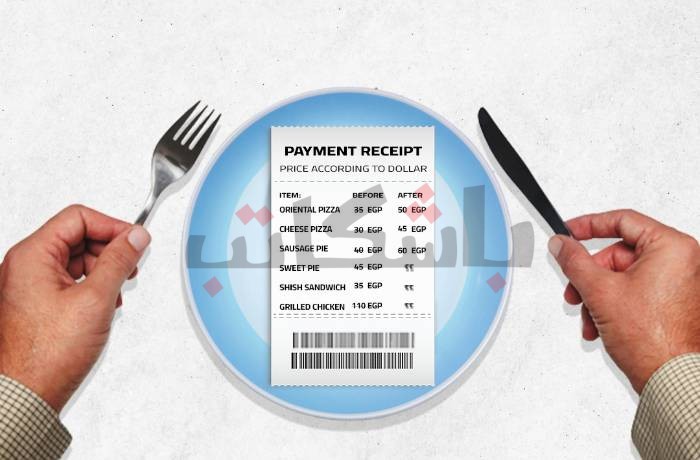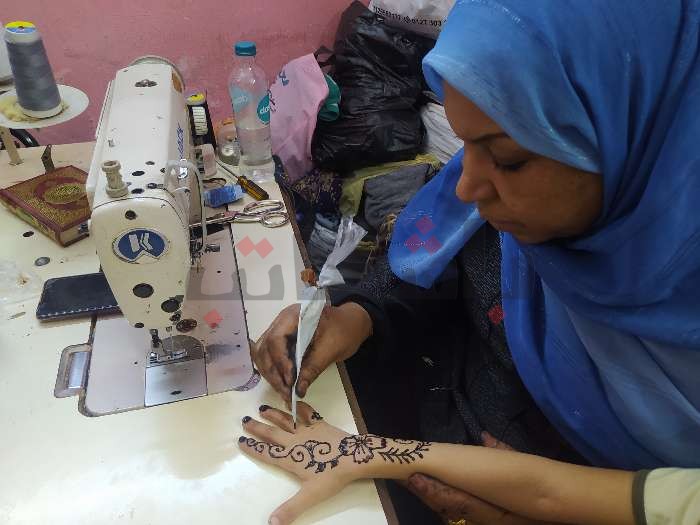During the past five months, Abdulrahman Hany had to change the prices on the menu of his restaurant selling pizza and pies in Dar Al-Salam more than once, for the increase in the raw materials’ prices on which he depends on put him between a rock and a hard place, either to increase the meals’ prices or close the restaurant.
Each time Abdulrahman prints a new “menu” it costs him not less than 600 EGP; he uses menus in advertisement and for the customers to be aware of the new prices, he is even forced to stop serving some of the meals for their ingredients increased in prices and customers are no longer able to buy them.
As Abdulrahman and other restaurants owners in Dar Al-Salam welcome the holy month of Ramadan, and instead of seeing it a season for many orders for Iftar like every year, high prices and raw materials that the restaurants depend on stand as a continuous threat putting their livelihoods at the danger of closure.
“A 50-kilogram sack of flour has increased from 280 EGP to 750 EGP, and some would sell it for 1,200 EGP, as for mozzarella cheese which pizza depends on, 1 kilogram has increased costing 100 EGP after it was 40 EGP only; flour and cheese are the basic ingredients in any restaurant, let alone the increase of other services prices”, said Abdulrahman to “Sout Al-Salam”.
The crisis of high prices was reflected in the movement of the streets of Dar Al-Salam, for after they were noisy and crowded with restaurants and customers, the noises lessened and numbers of customers decreased, and that what happened to Abdulrahman’s restaurant that used to witness a huge demand from pastries fans, before the situation changed and the prices of its meals became unaffordable by all the neighbourhood’s residents.
Abdulrahman’s daily sales decreased by nearly half which put him in a big financial crisis, as he described, for he buys the food ingredients, pays the rent and bills and staff salaries according to the new prices, in return he cannot increase the meals prices in accordance with this leap in prices for customers would stop buying them, consequently Abdulrahman won’t be able to cover his capital.
Pizza prices have doubled, putting a burden on any family who would want to eat out even for a day weekly, “large Pizza used to range between 25 and 35 EGP, now it costs 50 EGP, so a five-members-family would pay 200 or 300 EPG for lunch instead of 100 or 150 EGP. Unfortunately, salaries have not kept pace with the increase in prices, so families have given up buying ready-made meals in exchange for providing their basic needs”, clarified Abdulrahman.
The crisis of high prices out a huge load on business owners, to the extent that some resorted to lay off some workers, just like what happened with Abdulrahaman who lost two of his main assistants who worked for him for 4 years, indicating that he is not happy with the way things turned out, but he cannot blame them for leaving for they have families to provide for.
Abdulrahman and his business partner didn’t postpone their dream of expanding the restaurant and opening other branches, they had to work themselves everyday from 11 am to 3 am, “I’m always exhausted, I work as a cook, cashier, and even delivery boy, I seldom see my children whom I need to provide for and they are my priority”, said Abdulrahman.
Amidst the closure of many restaurants in Dar Al-Salam due to financial losses, Abdulrahman and his partner are still struggling, for despite the anxiety Abdulrahman is living in for the fear of having his restaurant closed and losing his money and all the years he spent in building his small project, he decided to standfast in the hope to survive.
Just as the owners of restaurants that serve luxury meals such as pizza, pastries, and meat were affected by the crisis of rising prices, the owners of local meals selling beans and falafel sandwiches were affected too; they also had to increase their prices so that the price of the falafel sandwich became 4 EGP instead of 2 EGP, this in addition to the increase in the prices of side dishes that no meal is complete without, such as potatoes, tahini, pickles, and others, which made the price of breakfast a burden for many.
Despite these kinds of foods are basic in Suhur meal during Ramadan, not many cannot afford buying ready-made meals due to the increase in the prices. Families started preparing beans at home or give up fries considering it a luxury.
Liver and sausages are one of the most famous local sandwiches in Dar Al-Salam, and Mohamed Abdulbaset restaurant a.k.a. “Mohamed Kofta” excels at making them, in addition to a long list of other meat-based sandwiches, making Mohamed’s restaurant one of the most famous places until last September, since then, Mohamed had to cut the list to include only liver, sausage, and shawarma sandwiches, for customers stopped buying other sandwiches for being too expensive.
Mohamed chose not printing updated menus, and decided to hang a large one on the wall being cheaper; the prices increased by 20% until now so any customer can see the list on the wall, “I gain nothing from this increase, but it was necessary so as not to close the restaurant, for sales has drastically decreased than before”, said Mohamed.
Mohamed gave an example of the increase in the prices of food ingredients, saying that he used to buy a 20-litre oil bottle for 210 EGP, which increased in price until it reached 875 EGP last October, then 1,300 EGP last January, indicating that he is concerned about this financial crisis, which he has not witnessed in the thirty years of his work in the restaurant industry.
In order to survive this crisis, many businesses now resort to decreasing food quantities offered to the customers, and some inform their customers about them as they would notice it anyway. Doing this, the business owner makes some profit on one hand, and on the other hand the customer would receive a relatively cheap meal that makes them happy by changing from eating traditional home food every day.


